
Henry V (1387-1422) - King of
England 1413-1422
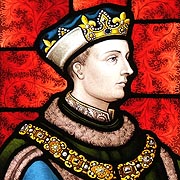 |
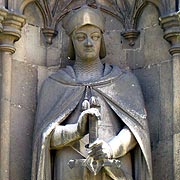 |
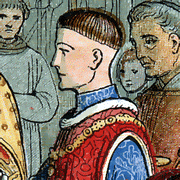
|
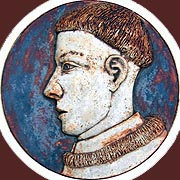
|
King Henry V, the eldest son of Henry, Earl of Derby - afterwards Duke of Hereford and then King Henry IV - and Mary Bohun, coheiress of the Earldom of Hereford, was born at Monmouth Castle. He was educated by his uncle, Henry, afterwards Cardinal Beaufort, and was, possibly, for a time at Queen's College, Oxford. He was with his fatherís cousin, King Richard II, in Ireland at the date of the Dukeís usurpation of the throne, and seems to have been treated with kindness by that King, whose body he removed, at the beginning of his own reign, to Westminster Abbey.
During his father's reign, Henry was employed upon several warlike expeditions both to Wales and to Scotland, and, in particular, he fought bravely at the Battle of Shrewsbury in 1403. But his close friendship with the Beaufort family, whose dictation the King dreaded, led him, in 1410, into a breach with his father and possibly into an attempt to compel the latter to abdicate. This led to his exclusion from the Council.
There is no reason to question the received tradition that Prince Henry was a 'wild' young man, but when, upon his father's death, he ascended the throne as King Henry V, it is quite evident that he became, at once, a most sober and businesslike King. He also became a most devout and bigoted Churchman and continued to persecute the Lollards with the greatest vigour. The revival of the claim of the English Kings to the Crown of France was also his work and he set about prosecuting that claim with all his might.
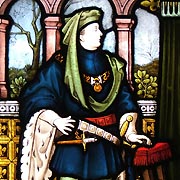 |
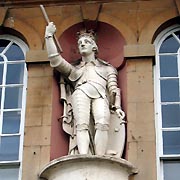
|
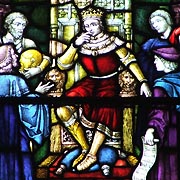
|
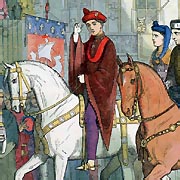
|
His first expedition to France landed at the mouth of the Seine in 1415. Henry captured Harfleur and then undertook, with rapidly dwindling forces, the dangerous overland march to Calais, in the course of which he won, by superior tactics on 25th October, the great Battle of Agincourt against enormous odds. He then returned in triumph to England and received, in the following year, a visit from the Emperor Sigismund, who consulted with him as to a projected 'reform' of the Church. No peace, however, had been made with France and no real conquests achieved, except the capture of Harfleur, and, in 1417, Henry sailed again to France with a very large army and spent two years in a steady and merciless reduction of the various cities and fortresses of Normandy. Only the frightful internal dissensions between the French princes and the insanity of King Charles VI permitted him this hard-won and temporary success. His cruelties at Rouen, which only capitulated after a long and heroic defence, hardened all French hearts against him. In 1419, the murder of the Duke of Burgundy by the Dauphin and the partisans of the rival House of Orleans threw, onto the English side, the powerful Burgundian family which ruled in the Low Countries and had great influence over all the north of France. At last, in 1420, the poor King of France gave up the struggle and concluded, at Troyes, a peace, by which he recognized Henry as Regent and heir of France and gave him his daughter, Katherine, as his wife. Early in 1421, Henry and Katherine landed at Dover and, in June, Henry had to return to his sorry task of holding down his prospective Kingdom of France by the sword. His last act was the capture of Meaux, during the siege of which he became seriously ill. He died at Vincennes on 31st August 1422, in the thirty-sixth year of his age.
It is, before all things, as a conqueror that Henry V is pre-eminent. That he really believed his claim to the French Crown to be founded in justice seems, in the case of such an intelligent man, to be impossible; but it suited him to say that he believed it. In the prosecution of this claim, he spared no pains and intended to make his conquests permanent. He covered the whole of this ambitious policy with a mantle of religion, which may have been fanaticism or may have been hypocrisy, but which, at any rate, was an essential part of the popular and plausible Lancastrian character. He always said that he intended to unite the crowns of the two great Western nations with a view to a crusade for the deliverance of the Holy Sepulchre. He was a considerable reader of religious and crusading literature and he took a keen interest in the healing of the schism then existing in the Western Church. Such a character, backed up by a firm hand in domestic administration, made Henry not only a successful and popular ruler at home, but also, to some extent, a national hero for generations after. Of his ability on the battlefield, and especially in siege-craft, there can be no doubt; but his legacy to his country was a re-opening of the terrible French War and this, again, bequeathed to the England of his son's reign the damnosa hereditas of the War of the Roses.
Edited from CRL Fletcher's 'Historical Portraits' (1909)
The pictures on this page are cropped examples of images in our high resolution photo library. Please e-mail us for details of these or similar image availability at our very reasonable reproduction rates. Location release may be required for some photos.
Click for Next
Monarch